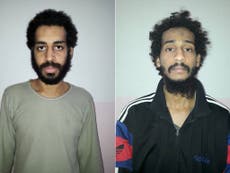Isis 'Beatles': Brother of murdered British hostage says he does not hate Isis killers
Exclusive: Mike Haines says he is glad Alexanda Kotey and El Shafee Elsheikh will not face death penalty
Your support helps us to tell the story
From reproductive rights to climate change to Big Tech, The Independent is on the ground when the story is developing. Whether it's investigating the financials of Elon Musk's pro-Trump PAC or producing our latest documentary, 'The A Word', which shines a light on the American women fighting for reproductive rights, we know how important it is to parse out the facts from the messaging.
At such a critical moment in US history, we need reporters on the ground. Your donation allows us to keep sending journalists to speak to both sides of the story.
The Independent is trusted by Americans across the entire political spectrum. And unlike many other quality news outlets, we choose not to lock Americans out of our reporting and analysis with paywalls. We believe quality journalism should be available to everyone, paid for by those who can afford it.
Your support makes all the difference.The brother of a British hostage murdered by Isis has said he does not hate the jihadis accused of causing his death, and is glad they will not face the death penalty.
Mike Haines’ brother, aid worker David Haines, was the third victim beheaded by the “Beatles” cell in 2014 after being abducted near a Syrian refugee camp.
Two of the four members, Alexanda Kotey and El Shafee Elsheikh, were flown to the US this week to face charges including hostage-taking resulting in death.
Executioner Mohammed Emwazi, known as Jihadi John, was killed in a drone strike and another member of the group has been jailed in Turkey.
Mr Haines told The Independent that he no longer hates the militants responsible for his brother’s death.
“Hate is the choice,” he added. “We all have the power not to hate.”
He recalled how he was told of his brother’s death, which was broadcast in a gory Isis propaganda video, while getting ready for bed at his Dundee home.
“My first reaction was anger, frustration and hatred, I wanted to go to Syria and kill them,” he said. “I’ve never felt emotion so strong.
“I gathered my family together and I took mum’s hands and told her her son couldn’t be hurt any more – if someone could have flicked a switch I would have gone to Syria.
“I would have made a brilliant target and my family would have lost another son.”
But now, Mr Haines said he does not want Kotey and Elsheikh to face the death penalty for their alleged crimes.
The US attorney general has pledged not to seek capital punishment if they are convicted, after Elsheikh’s mother launched a legal challenge over a previous lack of assurances.
“We’re really glad the death penalty was taken off the table by the American government,” Mr Haines said.
“The death penalty or execution in some other country would just be such a recruitment coup for Isis and their like.
“We know their system of recruitment uses them as martyrs and promotes them as heroes.”
Kotey and Elsheikh face an eight-count indictment, which names only the four American hostages murdered but includes a wider charge of conspiracy to commit hostage taking resulting in death.
They are being prosecuted in the US after the UK government claimed it would not be able to put them on trial and removed their British citizenship.
Mr Haines said he was glad that his family and those of the other murdered hostages would finally “get some justice”, but added: “I don’t have enough legal knowledge to understand why they went to the States and not here.”
After his brother’s death, he launched an organisation called Global Acts of Unity that aims to promote tolerance and understanding in schools.
Mr Haines believes that he has so far given speeches to more than 100,000 people in his quest to thwart the hatred that fuels all kinds of terrorism.
“I knew I had to do something – my brother’s murder was about hatred, it was about division,” he added.
“They took my brother’s life but if I could take someone away from a path of hatred and help them choose a different path, we’ve won.”
The project mainly targets teenagers in year eight and upwards, seeing Mr Haines talk about his brother’s life and death before speaking about wider hatred.
The aim is to present hatred as a choice, he said, adding: “If I don’t hate the people who murdered my brother, how can they hate someone who called them a name? We can see the emotional journey the students are on.”
Like many people working to counter extremism in Britain, Mr Haines fears that more people are becoming vulnerable to radicalisation after being pushed to the fringes of society.
“The polarisation of communities has grown more and more and since lockdown we have seen a massive increase in the extremist grooming of our youth,” he said.
“There are people out there looking for angry young men and women and twisting them for their own purposes whether it be criminal, whether it be sexual, whether it be extremist. There are so many predators out there.”
Subscribe to Independent Premium to bookmark this article
Want to bookmark your favourite articles and stories to read or reference later? Start your Independent Premium subscription today.


